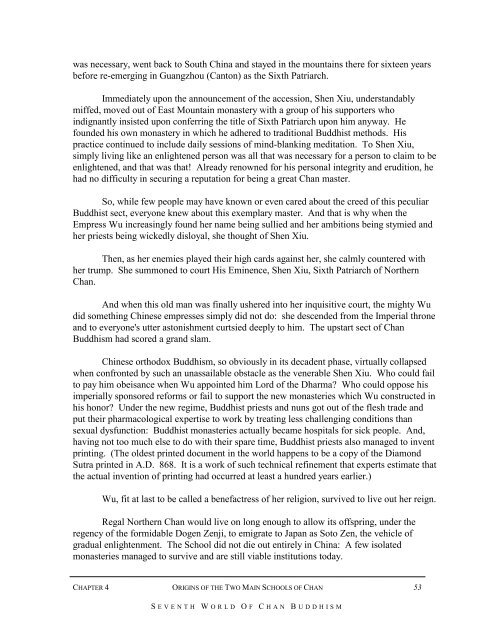seventh world of chan buddhism - Zen Buddhist Order of Hsu Yun
seventh world of chan buddhism - Zen Buddhist Order of Hsu Yun
seventh world of chan buddhism - Zen Buddhist Order of Hsu Yun
Create successful ePaper yourself
Turn your PDF publications into a flip-book with our unique Google optimized e-Paper software.
was necessary, went back to South China and stayed in the mountains there for sixteen years<br />
before re-emerging in Guangzhou (Canton) as the Sixth Patriarch.<br />
Immediately upon the announcement <strong>of</strong> the accession, Shen Xiu, understandably<br />
miffed, moved out <strong>of</strong> East Mountain monastery with a group <strong>of</strong> his supporters who<br />
indignantly insisted upon conferring the title <strong>of</strong> Sixth Patriarch upon him anyway. He<br />
founded his own monastery in which he adhered to traditional <strong>Buddhist</strong> methods. His<br />
practice continued to include daily sessions <strong>of</strong> mind-blanking meditation. To Shen Xiu,<br />
simply living like an enlightened person was all that was necessary for a person to claim to be<br />
enlightened, and that was that! Already renowned for his personal integrity and erudition, he<br />
had no difficulty in securing a reputation for being a great Chan master.<br />
So, while few people may have known or even cared about the creed <strong>of</strong> this peculiar<br />
<strong>Buddhist</strong> sect, everyone knew about this exemplary master. And that is why when the<br />
Empress Wu increasingly found her name being sullied and her ambitions being stymied and<br />
her priests being wickedly disloyal, she thought <strong>of</strong> Shen Xiu.<br />
Then, as her enemies played their high cards against her, she calmly countered with<br />
her trump. She summoned to court His Eminence, Shen Xiu, Sixth Patriarch <strong>of</strong> Northern<br />
Chan.<br />
And when this old man was finally ushered into her inquisitive court, the mighty Wu<br />
did something Chinese empresses simply did not do: she descended from the Imperial throne<br />
and to everyone's utter astonishment curtsied deeply to him. The upstart sect <strong>of</strong> Chan<br />
Buddhism had scored a grand slam.<br />
Chinese orthodox Buddhism, so obviously in its decadent phase, virtually collapsed<br />
when confronted by such an unassailable obstacle as the venerable Shen Xiu. Who could fail<br />
to pay him obeisance when Wu appointed him Lord <strong>of</strong> the Dharma? Who could oppose his<br />
imperially sponsored reforms or fail to support the new monasteries which Wu constructed in<br />
his honor? Under the new regime, <strong>Buddhist</strong> priests and nuns got out <strong>of</strong> the flesh trade and<br />
put their pharmacological expertise to work by treating less challenging conditions than<br />
sexual dysfunction: <strong>Buddhist</strong> monasteries actually became hospitals for sick people. And,<br />
having not too much else to do with their spare time, <strong>Buddhist</strong> priests also managed to invent<br />
printing. (The oldest printed document in the <strong>world</strong> happens to be a copy <strong>of</strong> the Diamond<br />
Sutra printed in A.D. 868. It is a work <strong>of</strong> such technical refinement that experts estimate that<br />
the actual invention <strong>of</strong> printing had occurred at least a hundred years earlier.)<br />
Wu, fit at last to be called a benefactress <strong>of</strong> her religion, survived to live out her reign.<br />
Regal Northern Chan would live on long enough to allow its <strong>of</strong>fspring, under the<br />
regency <strong>of</strong> the formidable Dogen <strong>Zen</strong>ji, to emigrate to Japan as Soto <strong>Zen</strong>, the vehicle <strong>of</strong><br />
gradual enlightenment. The School did not die out entirely in China: A few isolated<br />
monasteries managed to survive and are still viable institutions today.<br />
CHAPTER 4 ORIGINS OF THE TWO MAIN SCHOOLS OF CHAN<br />
S EVENTH W ORLD O F C HAN B UDDHISM<br />
53


